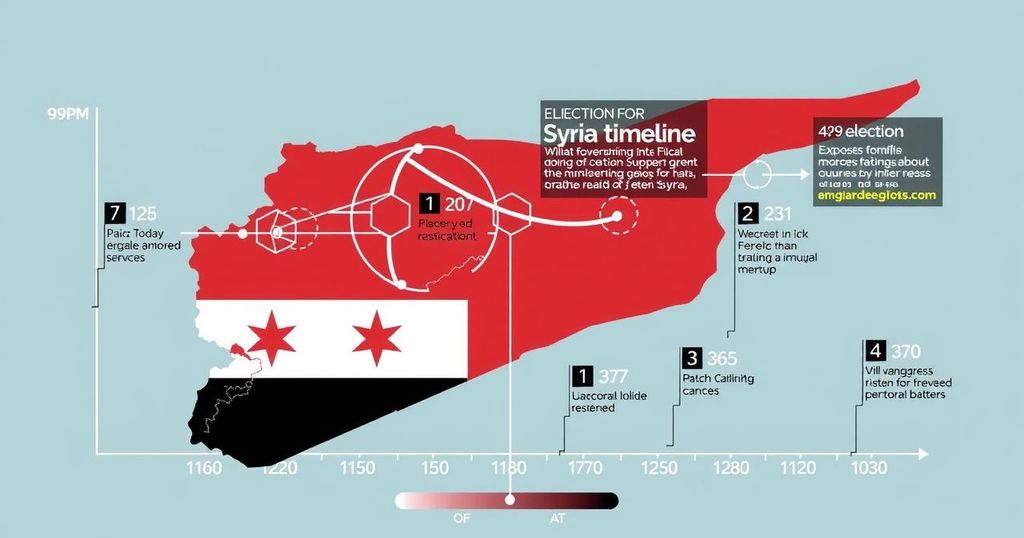Syria’s Leadership Signals Extended Timeline for Elections Post-Assad

Syria’s de facto leader, Ahmed al-Sharaa, announced that elections may be delayed up to four years post-Assad’s ousting, citing constitutional drafting and census requirements. He emphasized regional stability and strategic ties with Russia, expressing hope for lifted US sanctions. These insights highlight the complexities of establishing a new political order in a war-torn Syria.
In a significant announcement, Syria’s de facto leader, Ahmed al-Sharaa, indicated that the country may take up to four years to organize elections following the ousting of former President Bashar al-Assad. This statement marks al-Sharaa’s first discussion regarding an electoral timeline since the fall of al-Assad three weeks ago, with opposition forces under al-Sharaa’s Hayat Tahrir al-Sham (HTS) being the driving force behind the regime change.
Al-Sharaa elaborated on the electoral process, noting that the drafting of a new constitution could take approximately three years, and emphasized the necessity of conducting a comprehensive population census to determine eligible voters. “Any meaningful elections will require conducting a comprehensive population census,” stated al-Sharaa. He optimistically forecasted that significant developments in Syria could be witnessed within a year, suggesting the dissolution of HTS at an impending national dialogue conference.
While addressing concerns of regional stability, al-Sharaa assured neighboring countries that “Syria will not be a source of disturbance to anyone.” Furthermore, he reiterated the strategic partnership with Russia, which has provided military support during the Syrian conflict. Russian Foreign Minister Sergey Lavrov discussed ongoing negotiations regarding Russia’s military presence in Syria, emphasizing the importance of coordination with the new leadership.
Amid these transitions, al-Sharaa expressed hope that the future administration of United States President-elect Donald Trump would consider lifting economic sanctions imposed on Syria. This perspective aligns with the statements made by senior US diplomats, who have recognized al-Sharaa’s pragmatic approach during their recent interactions in Damascus, including the decision to remove a financial bounty on the HTS leader.
The context of this announcement is rooted in the complex political landscape in Syria, which has been ravaged by a prolonged civil war spanning over 15 years. The recent ousting of Bashar al-Assad, a long-standing authoritarian figure, marks a pivotal shift in governance, leading to questions about the future democratic process in the war-torn nation. Ahmad al-Sharaa’s leadership is being scrutinized as the country navigates the challenges related to establishing a legitimate electoral framework and addressing the aftermath of conflict. The importance of engaging with international powers, such as Russia and the United States, is crucial for the stabilization and reconstruction of Syria, as highlighted in al-Sharaa’s remarks regarding foreign relations and sanctions.
In conclusion, Ahmed al-Sharaa’s comments shed light on the anticipated timeline for elections in Syria, potentially extending to four years. His remarks emphasize the necessity for a new constitution and census, reflecting a structured approach towards establishing governance post-Assad. As Syria seeks to regain stability and reassure neighboring countries, the dynamics between foreign powers and the new leadership will play a critical role in shaping the future of the nation.
Original Source: www.aljazeera.com








